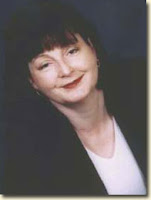Memorial site to Sir Dirk Bogarde, novelist & memoirist
Also in today's blog
My comments on readers' comments
Bibliophile's 250th catalogue arrives
By a happy chance, on Wednesday I happened to see a print edition of The Independent that contained a feature about the memorial site to the late Sir Dirk Bogarde launched on that day which would have been his 86th birthday. Surprisingly I couldn't find the feature at the online edition of the newspaper.

I have most of Bogarde's books, preferring the autobiographies to the novels, although I greatly enjoyed his second novel, Voices in the Garden, first published by Chatto & Windus in 1981. Amazon UK offer 60 new and used copies, but they've removed the reviews.
However if you haven't come across it, the all-important first page can be read at the site where the novel is summarised thus -
"In the splendid gardens of the Riviera villa a small group of people of widely differing character come together by chance, link, hold, and finally break away. Dirk's second novel explores these disparate lives - the elegant well-born English hosts, ageing, aware, and vulnerable; the two young holiday-makers, from opposite worlds in love and eagerly exploring their way together; a dynamic Italian film director (with yacht and entourage) intent on his own ambitions and at the height of dangerous powers. All are caught up in the potent chemistry of their meeting; none remains untouched as the mid-summer picnic ends, the yacht sails away, and the garden voices fade."
At a guess, the site will take at least an hour to explore fully. It could do with a search facility as I now can't find the page with the delightful photograph I have borrowed. It was taken by actress Charlotte Rampling.
My comments on readers' comments
As there have now been eight comments on Wednesday's blog, I can't deal with them all today. Perhaps it would be best to respond to them one at a time.
The opening line of the first comment on the blog about Julie Cohen amused me. Kate Walker, [see photo by Stirling Photography] a Mills & Boon romance writer, wrote, "Well Julie's web site, like her books, is not aimed at readers of your generation, so I wouldn't expect them to appeal."

When, in 20 years' time, you're my age, Kate, you'll find that, given good health, 77 is very little different, mentally, from 57. There are physical deteriorations, of course, but the mind, if kept active, doesn't change much and many eighty-something readers can identify with heroines of their great-grandaughters' generation…providing they have a spot of common sense.
I'm puzzled by your suggestion that no comment on a book is allowable unless one has read the whole thing, which I plan to do with Julie's.
As an infrequent Mills & Boon reader, it was news to me that "the unplanned pregnancy has been the basis of so many M&B stories" for longer than Kate has been writing. Even in the 1950s when my first M&B was published, there was plenty of advice available on how to plan pregnancies. So why, all these years later, sensible heroines - and who wants readers who can identify with the other kind? - are not in charge of their own bodies is puzzling.
Perhaps, as one of my paternal aunts had her life blighted by an unplanned and outside-marriage pregnancy, I was always particularly conscious of the risks of pre-marital sex. My own pregnancy was planned after nine years' of marriage with my thirtieth birthday looming. The following year, 1960, my eighth M&B, A Call For Nurse Templar, was published, dedicated to my [home] midwife - "with my warmest thanks for her help with the book and the baby."
All is grist to the writer's mill!
Bibliophile's 250th catalogue of book bargains
Yesterday I was delighted to receive a copy of the 250th Bibliophile catalogue - a 40-page tabloid-newspaper style list of "Britain's Best Postal Book Bargains".
"Founded in 1978 for budget bookworms of all ages, we have 30 years' experience of selling the finest selection of bargain books, which we have haggled over individually from publishers to get the best prices for you. We publish the the free catalogue every five weeks and this month we are celebrating our 250th issue!"
If you're not already on their mailing list and would like to be, email orders@bibliophilebooks.com
As some of you may remember, on Sunday, July 24, 2005, I wrote the following -
It was Frances Whitehead who introduced me to one of my life's delights. On 4 December 1986, she wrote -
"I'm enclosing a copy of Bibliophile, an organisation which may not be familiar to you. They specialise in the slightly off-beat (invariably remaindered because they don't have wide appeal) and they quite often feature art, antiques, embroidery and horses, all of which I know are amongst your interests. Scrap it if it's of no use, but I usually find something different and they will post overseas."
At that time Frances was deputy editorial director of Mills & Boon, then at 15-16 Brook's Mews, London W 1, conveniently close to Claridges where Alan Boon, whom Frances later succeeded as editorial director, took his authors for long, champagne-fuelled lunches.
That's all for this week. Back on Monday.









